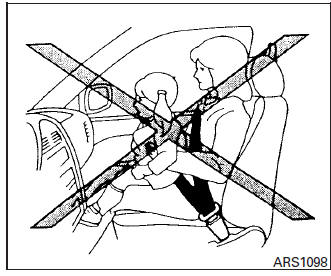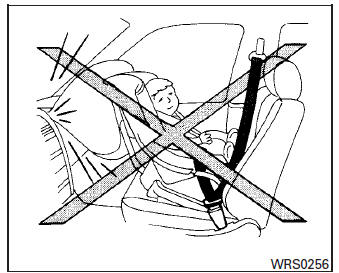
Nissan Micra: Precautions on child restraints
Nissan Micra Owners Manual


WARNING
|
| CAUTION A child restraint in a closed vehicle can become very hot. Check the seating surface and buckles before placing a child in the child restraint. |
This vehicle is equipped with a universal child restraint anchor system, referred to as the LATCH (Lower Anchors and Tethers for CHildren) system.
Some child restraints include rigid or webbing-mounted attachments that can be connected to these anchors. For additional information, refer to “LATCH (Lower Anchors and Tethers for CHildren) system” in this section.
If you do not have a LATCH compatible child restraint, the vehicle seat belts can be used.
Several manufacturers offer child restraints for infants and children of various sizes. When selecting any child restraint, keep the following points in mind:
- Choose only a restraint with a label certifying that it complies with Canadian Motor Vehicle Safety Standard 213.
- Check the child restraint in your vehicle to be sure it is compatible with the vehicle’s seat and seat belt system.
- If the child restraint is compatible with your
vehicle, place your child in the child restraint
and check the various adjustments to be
sure the child restraint is compatible with
your child. Choose a child restraint that is
designed for your child’s height and weight.
Always follow all recommended procedures.
- If the combined weight of the child and child restraint is less than 65 lbs (29.5 kg), you may use either the LATCH anchors or the seat belt to install the child restraint (not both at the same time).
- If the combined weight of the child and child restraint is greater than 65 lbs (29.5 kg), use the vehicle’s seat belt (not the lower anchors) to install the child restraint.
- Be sure to follow the child restraint manufacturer’s instructions for installation.
All Canadian provinces or territories require that infants and small children be restrained in an approved child restraint at all times while the vehicle is being operated.
Canadian law requires the top tether strap on forward-facing child restraints be secured to the designated anchor point on the vehicle.
Other info:
Seat Ibiza. First-aid kit, warning triangle, fire extinguisher
First-aid kit, warning triangle and fire extinguisher
The use of reflective warning triangles is obligatory in emergencies in some
countries. As are the first aid kit and a set of spare lightbulbs. ...
Fiat Punto. If an exterior light burns out
For the type of bulb and power rating, see “When needing to change a
bulb”.
FRONT LIGHT UNITS
The front light units contain: sidelights, dipped beam, main beam and
direction indicator bulbs.
...
Mazda 2. AUX/USB/iPod mode
Audio can be heard from the vehicle's
speakers by connecting a commerciallyavailable
portable audio unit to the
auxiliary jack.
A commercially-available, non-impedance
(3.5 ) stereo mini plug l ...
Manuals For Car Models
-
 Chevrolet Sonic
Chevrolet Sonic -
 Citroen C3
Citroen C3 -
 Fiat Punto
Fiat Punto -
 Honda Fit
Honda Fit -
 Mazda 2
Mazda 2 -
 Nissan Micra
Nissan Micra -
 Peugeot 208
Peugeot 208 -
 Renault Clio
Renault Clio -
 Seat Ibiza
Seat Ibiza -
 Skoda Fabia
Skoda Fabia - Honda Pilot
- Volkswagen ID4
- Toyota Prius


